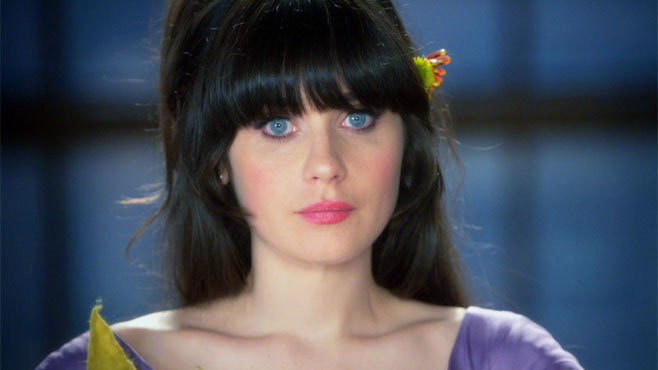The term “Manic Pixie Dream Girl” was invented by critic Nathan Rabin, writing in 2007 for the web site The A.V. Club in order to explain his disappointment with Kirsten Dunst’s character in the film Elizabethtown:
That bubbly, shallow cinematic creature that exists solely in the fevered imaginations of sensitive writer-directors to teach broodingly soulful young men to embrace life and its infinite mysteries and adventures.
While Rabin has rightly brought to light how this Hollywood trope is quite often sexist in its relegation of women to the position of muses who exist to guide the blossoming of male characters, while having no agenda or inner life of their own, a metamodernist perspective can, to some extent, respectfully embrace these kinds of quirky female characters, especially when they are drawn wtith some complexity.
For example, Zoey Deschanel’s “Jess” in the television show New Girl is sometimes cited as a recent example of a MPDG. Indeed, at the beginning of the series she enters the lives of three young men, old friends who are set in their relationships with each other as well as in their self concepts, as a disruptive force, charming the boys into relating to each other in new ways, and considering new options in their lives. However, as the series progresses, we see that Jess’s inner life is as complex as that of any of the male characters, and that much – most, even – of her off-beat behavior is self-motivated. She is out to convince herself, as much as anybody else, that life can be rewarding if people are willing to make choices that honor their inner impulses.
Similarly, in the surprisingly successful 2001 romantic comedy Amélie, Audrey Tatou plays a young Parisian woman who spends much of the film manipulating events in quirky, fanciful ways in order to help bring the dreams of the people around her into reality. However, by the end of the film, it becomes clear that Amélie is lonely and hemmed in by her own shyness and insecurity. An older male character sees into this Manic Pixie Dream Girl’s personal narrative and encourages her to take steps towards finding love with a young man who is already realized in his own quirkiness.
Critic Camilla Collar, in a video blog hosted by Allmovie.com, has coined the term “Manic Pixie Dream Bitch” to discuss female characters who seem initially to be smiling MPDG saviors for their male counterparts, but then are revealed to be confused, misguided, self-absorbed or problematic in other ways that Collar views as redeeming because they are whole-person-making. Additionally, many of these women rebel against – and make explicit – the MPDG trope. For example: Kate Winslett’s “Clementine” in Eternal Sunshine of the Spotless Mind, who says to Jim Carey’s character “Joel” (as their relationship is dissolving), “Too many guys think I’m a concept, that I’m gonna complete them or make them alive, but I’m just a fucked up girl who’s looking for her own peace of mind.” Collar’s other two favorite Manic Pixie Dream Bitches are Zoey Deschanel’s “Summer” in 500 Days of Summer and Catherine Zeta-Jones as “Charlie” in High Infidelity.
So, are these characters still MPDGs if they defy the flat, chauvinistic cliche that Rabin identified? Does Manic Pixie Dream Girl have to be used dismissively? With all due respect to Rabin as the originator of the term, we would suggest that it is his own narrow construal of the construct that makes it flattening and sexist. A person can be manic, and pixie-like, and dreamy, and female and youthful, and bring playfulness and new perspectives into other people’s lives, and still be complicated, brooding and self-realized. Not seeing that all of these qualities can co-exist in a meaningful way is perhaps a failing of the modern and post-modern perspectives, and a critic who is oriented that way may be inclined to overlook films that are exemplary of metamodernism’s emphasis on felt experience as a way of resolving apparently conflicting dualities.
*****
You may also enjoy this more recent post:



